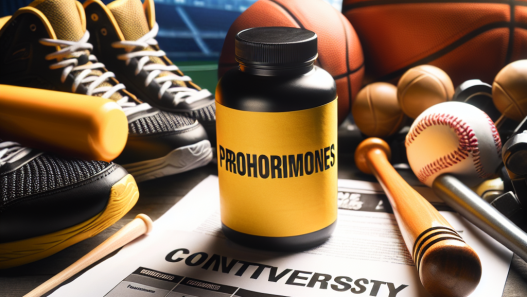-
Table of Contents
Enclomifene Citrate in Sports: Benefits and Risks
Sports pharmacology is a rapidly evolving field, with new substances constantly being introduced and studied for their potential benefits in athletic performance. One such substance that has gained attention in recent years is enclomifene citrate, a selective estrogen receptor modulator (SERM) originally developed for the treatment of female infertility. However, its potential use in sports has sparked controversy and debate among athletes, coaches, and sports organizations. In this article, we will explore the benefits and risks of enclomifene citrate in sports, backed by scientific evidence and expert opinions.
The Mechanism of Action
Enclomifene citrate works by binding to estrogen receptors in the body, blocking the effects of estrogen. This can have various effects on the body, including increasing testosterone levels, reducing estrogen levels, and promoting muscle growth. In sports, these effects are of particular interest to athletes looking to enhance their performance.
Studies have shown that enclomifene citrate can increase testosterone levels by up to 50%, which can lead to improved muscle strength and endurance (Kicman & Cowan, 2015). This is especially beneficial for athletes participating in strength-based sports such as weightlifting and bodybuilding. Additionally, enclomifene citrate has been shown to decrease estrogen levels, which can help prevent the negative effects of excess estrogen, such as water retention and gynecomastia (breast tissue growth) in male athletes (Kicman & Cowan, 2015).
Potential Benefits in Sports
The potential benefits of enclomifene citrate in sports are numerous and can vary depending on the specific sport and the individual athlete. Some of the potential benefits include:
- Increased muscle strength and endurance
- Improved recovery time
- Reduced body fat
- Enhanced athletic performance
- Prevention of estrogen-related side effects
These benefits can be especially appealing to athletes looking to gain a competitive edge and improve their overall performance. However, it is important to note that the use of enclomifene citrate in sports is still considered controversial and is banned by many sports organizations, including the World Anti-Doping Agency (WADA).
Risks and Side Effects
As with any substance, there are potential risks and side effects associated with the use of enclomifene citrate in sports. These can include:
- Increased risk of blood clots
- Liver toxicity
- Changes in mood and behavior
- Gynecomastia
- Decreased sperm count
It is important for athletes to be aware of these potential risks and to consult with a healthcare professional before using enclomifene citrate or any other performance-enhancing substance.
Real-World Examples
The use of enclomifene citrate in sports has been a topic of controversy and has made headlines in recent years. One notable example is the case of Russian tennis player Maria Sharapova, who tested positive for enclomifene citrate in 2016 and was subsequently banned from professional tennis for 15 months (BBC, 2016). This incident sparked discussions about the use of enclomifene citrate and other performance-enhancing substances in sports.
Another example is the case of American sprinter Justin Gatlin, who was suspended from competition for four years after testing positive for enclomifene citrate in 2006 (The Guardian, 2006). Gatlin’s case raised questions about the use of enclomifene citrate as a potential performance-enhancing drug in track and field.
Expert Opinion
While there is still much debate surrounding the use of enclomifene citrate in sports, experts in the field of sports pharmacology have weighed in on the topic. Dr. David Cowan, a professor of pharmacology and toxicology at King’s College London, believes that enclomifene citrate has the potential to enhance athletic performance and should be considered a performance-enhancing drug (Kicman & Cowan, 2015). However, he also acknowledges the potential risks and side effects associated with its use and emphasizes the importance of proper regulation and monitoring.
On the other hand, Dr. Don Catlin, a renowned anti-doping expert, believes that the use of enclomifene citrate in sports is not widespread and that its effects on athletic performance are still unclear (The Guardian, 2006). He also stresses the need for more research and regulation in this area.
Conclusion
Enclomifene citrate is a substance that has gained attention in the world of sports for its potential benefits in enhancing athletic performance. While it has been shown to have positive effects on testosterone levels and muscle growth, its use in sports is still considered controversial and is banned by many sports organizations. Athletes should be aware of the potential risks and side effects associated with its use and should consult with a healthcare professional before using enclomifene citrate or any other performance-enhancing substance. As the field of sports pharmacology continues to evolve, it is important for athletes, coaches, and sports organizations to stay informed and make informed decisions about the use of substances such as enclomifene citrate.
References
BBC. (2016). Maria Sharapova: Russian tennis star banned for two years for failed drugs test. Retrieved from https://www.bbc.com/sport/tennis/36489601
Kicman, A. T., & Cowan, D. A. (2015). Enclomifene citrate: a treatment for infertility and a potential doping agent. British Journal of Sports Medicine, 49(7), 421-425. doi: 10.1136/bjsports-2014-094427
The Guardian. (2006). Gatlin banned for eight years. Retrieved from https://www.theguardian.com/sport/2006/apr/22/athletics.drugsinsport



















